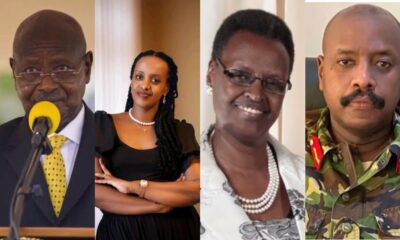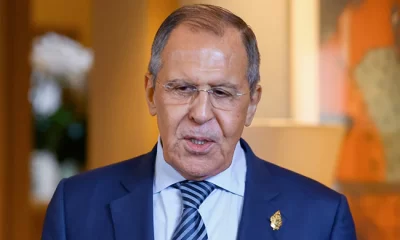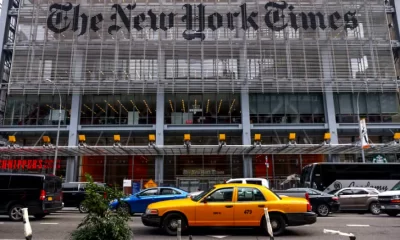Political Issues
Why President Bola Ahmed Tinubu Deserves a Second Term -By Jabir T. Usman
This informal agreement ensured that power alternated between the North and South, creating a balance in the country’s fragile political landscape. A typical example was President Olusegun Obasanjo’s two-term leadership from the South, followed by the election of Umaru Musa Yar’Adua from the North. Obasanjo’s commitment to that pact set a significant precedent in Nigerian politics, underscoring the importance of trust and continuity in leadership transitions.

Nigeria, as a deeply heterogeneous society, has long grappled with the challenges of ethnic sentiments, regionalism, and political tribalism. From the dawn of the First Republic, leaders realized the importance of forming coalition governments to ensure national integration and unity. This gave each region a sense of belonging and ownership in the governance process. With the return to democratic rule in 1999, the idea of power rotation, though not enshrined in the constitution; became a gentleman’s agreement among major political stakeholders to foster peaceful coexistence and fairness.
This informal agreement ensured that power alternated between the North and South, creating a balance in the country’s fragile political landscape. A typical example was President Olusegun Obasanjo’s two-term leadership from the South, followed by the election of Umaru Musa Yar’Adua from the North. Obasanjo’s commitment to that pact set a significant precedent in Nigerian politics, underscoring the importance of trust and continuity in leadership transitions.
However, the accidental rise of Goodluck Jonathan to the presidency following the unfortunate demise of Yar’Adua disrupted this delicate understanding. Jonathan’s decision to run again in 2011 was widely perceived as a breach of the zoning agreement, igniting political tensions that further deepened national fault lines. Despite this, Nigerians have continued to see power rotation as a vital pillar for national unity in a diverse federation.
Against this backdrop, President Bola Ahmed Tinubu’s emergence in 2023 represented not just a return to that understanding, but also a beacon of renewed hope. In just two years, Tinubu has demonstrated a resolute commitment to tackling the nation’s multi-faceted challenges through bold reforms, infrastructure expansion, and governance innovations. For these reasons, it is imperative to support him for a second term to consolidate on the gains made so far.
His administration has initiated some of the most ambitious infrastructure projects in recent Nigerian history. The Lagos-Calabar Coastal Highway, a game-changing development for trade and tourism, saw its first 30 kilometers commissioned in May 2025. Additional projects like the Sokoto–Badagry Highway and key roads leading to the Second Niger Bridge are creating thousands of jobs and connecting long-neglected regions.
In the energy sector, Tinubu has overseen the increase of Nigeria’s oil production to about 1.6 million barrels per day. Beyond oil, his visionary push for Compressed Natural Gas (CNG) transportation is reducing Nigeria’s fuel import burden and promoting clean energy. The administration’s off-grid electricity programs are lighting up underserved urban centers and rural communities alike.
Education has seen groundbreaking progress. The Student Loans Act, signed into law in April 2024, established the National Education Loan Fund (NELFUND), allowing students from less privileged backgrounds to pursue tertiary education. Over 22 new universities have been approved, and 11 private universities licensed, expanding access and improving quality in the higher education sector.
In tandem with educational reform, the government’s 3 Million Technical Talent (3MTT) Programme aims to equip three million youths with skills in data science, AI, cloud computing, and other digital tools by 2027. This initiative is already gaining traction, with tens of thousands of young Nigerians enrolled and accessing devices through flexible financing.
On the security front, Tinubu’s administration has taken decisive action. Security agencies have neutralized over 8,000 terrorists and kidnappers while rescuing an equal number of victims. His government implemented a zero-ransom policy to weaken the financial base of terror groups, and championed a landmark Supreme Court decision to restore autonomy to local governments, strengthening grassroots security and governance.
Health sector reforms have been remarkable. Over 1,000 primary healthcare centers have been revitalized nationwide, with another 5,500 in the pipeline. Health insurance coverage has increased from 16 million to 20 million Nigerians, while pilot programs offering free maternal care, dialysis, and cancer treatment in some regions reflect a new era of public health service delivery.
In terms of economic management, Tinubu’s government has pursued bold reforms that are beginning to yield positive results. The tax-to-GDP ratio improved from about 10% to over 13.5%, demonstrating better tax collection and increased government revenue without burdening the poor. Exemptions on food, education, and healthcare have cushioned the economic reforms for everyday Nigerians.
The results are evident. Nigeria’s economy posted a 4.6% GDP growth in Q4 2024, and the 2025 projection stands at around 3.6%. The fiscal deficit has narrowed significantly, dropping from 5.4% in 2023 to 3.0% in 2024. Most impressively, the debt service-to-revenue ratio — once nearly 100% — has been brought down to below 40%, signaling responsible fiscal management.
Despite vocal opposition from a so-called “Coalition,” most of whom are driven by vested interests and political bitterness, Tinubu’s administration continues to record progress. The coordinated attacks from these elements are designed to derail a government that is finally making difficult but necessary decisions for national recovery.
Critics may attempt to distract the public, but the evidence on ground speaks louder. The fuel subsidy removal, though initially painful, has resulted in increased state revenues, allowing sub-national governments to invest more in education, healthcare, and agriculture. Similarly, exchange rate reforms are beginning to stabilize the Naira and attract foreign investment.
Leadership requires courage, vision, and consistency, all traits President Tinubu has demonstrated in his short time in office. He is not only correcting years of economic mismanagement, but also laying a foundation that future administrations can build upon. His vision is long-term, and Nigeria cannot afford to cut that journey short.
A second term for President Tinubu is not just about politics, it is about continuity, stability, and development. We need to allow him to complete what he started. The road to prosperity is never easy, but with determined leadership, it becomes achievable. Tinubu has shown he is up to the task.
As 2027 approaches, Nigerians must reflect on the progress made so far and the potential for even greater advancement. No nation can grow with constant political instability and abrupt policy reversals. Continuity under President Tinubu will ensure that ongoing reforms mature and deliver their full impact.
Nigerians have in their hands a choice between retrogression and sustained progress. For a better future, for youth empowerment, economic stability, security, and national integration, President Bola Ahmed Tinubu deserves our mandate for a second term.
© Jabir T. Usman writes from Sabon Gari Tudun Wada, Kaduna jabson.usman@gmail.com










